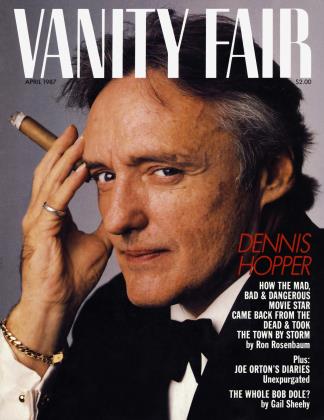Sign In to Your Account
Subscribers have complete access to the archive.
Sign In Not a Subscriber?Join NowMelanie Makes Thirty
SPOTLIGHT
Once she was too fast to live and too young to die. Now actress Melanie Griffith is old enough to know better
She shoots like an otter through the chlorinated pool and then glides up the ladder, sleek and dripping, in a lethal bikini. She is seventeen, with faint little freckles on her nose, charm-school posture, and very long legs. The man watching her at poolside is Paul Newman, who strains for sangfroid as she grazes his cheek with hers, murmuring in her candy-apple voice, "How would you like to help me put on some suntan lotion?"
"Wouldn't help, honey," he replies. "You're gonna be burnt out by the time you're thirty."
When Newman uttered that line in an execrable 1975 movie called The Drowning Pool, it seemed ominously appropriate. The young actress, Melanie Griffith, had already played hot-to-trot teenagers opposite Gene Hackman in Night Moves and Bruce Dem in Smile, and her life was becoming as notorious as her screen image. The daughter of Alfred Hitchcock's haunted muse Tippi Hedren (star of The Birds and Mamie), Griffith had been kicked out of a Catholic girls' school, had become estranged from her mother, and had scandalized Hollywood when, at sixteen, she moved in with her twenty-four-year-old boyfriend, a little-known actor named Don Johnson. By the age of twenty, she had married Johnson and divorced him; by twenty-three, she was as famous for drinking and drug taking as for her thespian skills. Her career had hit the skids: she wasn't in Paul Newman and Gene Hackman movies anymore; she was in Desi Arnaz Jr. movies. Burned out at thirty? Many thought she'd be lucky to be alive.
But Melanie Griffith will turn thirty in August, and she's flourishing. Her new movie, Cherry 2000, opens this spring ("I play kind of a Mad Maxine"), and later this year she'll show up as the wife of a greedy rancher in Robert Redford's The Milagro Beanfield War. As Hollywood cleanup stories go, hers is especially heartening, not just because she's young enough to have launched a new career, but also because she hasn't become a dewy-eyed priss about it all.
In 1980, a drunken driver hit her as she was crossing a Los Angeles street. It took her months to recover, and by the time she did, she had joined Alcoholics Anonymous; found a new husband (actor Steven Bauer, whom she is now divorcing); studied acting with Stella Adler; patched things up with her mother (and her father, real-estate magnate Peter Griffith); and even got religion ("I pray every night," she says). All of which might make one expect to find her doing Nun's Story remakes.
Instead she's been playing sleaze bunnies—a stripper in Fear City, a pom actress in Body Double, and a half-crazy seductress in Something Wild. Spectacularly. On-screen, Griffith comes across as at once childlike and pretematurally knowing; she looks like an erotic plaything, but she'll do the playing, thank you. Her blondness, her air of availability, and especially her hot-syrup voice all remind one of Marilyn Monroe. And as Cary Grant and Ginger Rogers said of Monroe in Monkey Business, she's half child—but not the half that shows.
Yet there are shades to Griffith that Monroe never had. That piping high voice, for instance—it's not quite a Kewpie-doll coo, the way Monroe's was. It's a little worn, a little experienced, and the more you listen, the more it seems to belong not to a young girl but to a rowdy prepubescent boy—it has randiness and mischief in it. Griffith's acting has a boyish quickness, too. Her sensual languor conceals hot-wire energies underneath; she's like someone doing a slow samba against a frenzied merengue beat.
"Acting is a child's game played with adult rules," she says. "What you really need is an open heart." She has a nineteenmonth-old son now, and a new boyfriend, agent Jean-Pierre Henraux. "And now I'm pretty happy," she says. "I want to do my job really well, but to do that you have to have a life."
And a past? "I don't regret any of it," says Griffith. "Whatever I've done added up to what I am now."
STEPHEN SCHIFF
 View Full Issue
View Full Issue












Subscribers have complete access to the archive.
Sign In Not a Subscriber?Join Now